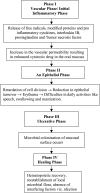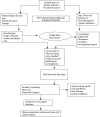Chemotherapy-induced and/or radiation therapy-induced oral mucositis--complicating the treatment of cancer
- PMID: 15548350
- PMCID: PMC1531648
- DOI: 10.1593/neo.04169
Chemotherapy-induced and/or radiation therapy-induced oral mucositis--complicating the treatment of cancer
Abstract
The term mucositis is coined to describe the adverse effects of radiation and chemotherapy treatments. Mucositis is one of the most common adverse reactions encountered in radiation therapy for head and neck cancers, as well as in chemotherapy, in particular with drugs affecting DNA synthesis (S-phase-specific agents such as fluorouracil, methotrexate, and cytarabine). Mucositis may limit the patient's ability to tolerate chemotherapy or radiation therapy, and nutritional status is compromised. It may drastically affect cancer treatment as well as the patient's quality of life. The incidence and severity of mucositis will vary from patient to patient. It will also vary from treatment to treatment. It is estimated that there is 40% incidence of mucositis in patients treated with standard chemotherapy and this will not only increase with the number of treatment cycles but also with previous episodes. Similarly, patients who undergo bone marrow transplantation and who receive high doses of chemotherapy have a 76% chance of getting mucositis. Patients receiving radiation, in particular to head and neck cancers, have a 30% to 60% chance. The exact pathophysiology of development is not known, but it is thought to be divided into direct and indirect mucositis. Chemotherapy and/or radiation therapy will interfere with the normal turnover of epithelial, cells leading to mucosal injury; subsequently, it can also occur due to indirect invasion of Gram-negative bacteria and fungal species because most of the cancer drugs will cause changes in blood counts. With the advancement in cytology, a more precise mechanism has been established. With this understanding, we can select and target particular mediators responsible for the mucositis. Risk factors such as age, nutritional status, type of malignancy, and oral care during treatment will play important roles in the development of mucositis. Many treatment options are available to prevent and treat this condition, but none of them can completely prevent or treat mucositis. More and more pathological methods are being developed to understand this condition so that better therapeutic regimens can be selected. Emphasis also should be made in assessing the patient's psychologic condition, particular depressive disorders. This is important because treatment with antidepressants will not only contribute in lifting depression but also reduces pain somatization. Although mucositis is rarely life-threatening, it will interfere with treatment of cancer to a great extent.
Figures
Similar articles
-
Assessment and prevalence of concomitant chemo-radiotherapy-induced oral mucositis in patients with oral squamous cell carcinoma.Turk J Med Sci. 2021 Apr 30;51(2):675-684. doi: 10.3906/sag-2007-131. Turk J Med Sci. 2021. PMID: 33155791 Free PMC article.
-
Radiation therapy and chemotherapy-induced oral mucositis.Braz J Otorhinolaryngol. 2007 Jul-Aug;73(4):562-8. doi: 10.1016/s1808-8694(15)30110-5. Braz J Otorhinolaryngol. 2007. PMID: 17923929 Free PMC article. Review.
-
Prevention and treatment of chemo- and radiotherapy-induced oral mucositis.Minerva Stomatol. 2002 May;51(5):173-86. Minerva Stomatol. 2002. PMID: 12070468 Review.
-
Oral mucositis in cancer therapy.J Support Oncol. 2004 Nov-Dec;2(6 Suppl 3):3-8. J Support Oncol. 2004. PMID: 15605918 Review.
-
Chemotherapy-induced oral mucositis is associated with detrimental bacterial dysbiosis.Microbiome. 2019 Apr 25;7(1):66. doi: 10.1186/s40168-019-0679-5. Microbiome. 2019. PMID: 31018870 Free PMC article.
Cited by
-
Photodynamic Therapy for X-ray-Induced Radiation-Resistant Cancer Cells.Pharmaceutics. 2023 Oct 26;15(11):2536. doi: 10.3390/pharmaceutics15112536. Pharmaceutics. 2023. PMID: 38004516 Free PMC article.
-
Effectiveness, Tolerability, and Safety of Ectoine-Containing Mouthwash Versus Those of a Calcium Phosphate Mouthwash for the Treatment of Chemotherapy-Induced Oral Mucositis: A Prospective, Active-Controlled, Non-interventional Study.Oncol Ther. 2018 Jun;6(1):59-72. doi: 10.1007/s40487-018-0060-z. Epub 2018 May 9. Oncol Ther. 2018. PMID: 32700140 Free PMC article.
-
Management of Oral Mucositis in Children With Malignant Solid Tumors.Front Oncol. 2021 Mar 30;11:599243. doi: 10.3389/fonc.2021.599243. eCollection 2021. Front Oncol. 2021. PMID: 33859935 Free PMC article.
-
PGMD/curcumin nanoparticles for the treatment of breast cancer.Sci Rep. 2021 Feb 15;11(1):3824. doi: 10.1038/s41598-021-81701-x. Sci Rep. 2021. PMID: 33589661 Free PMC article.
-
Assessment and prevalence of concomitant chemo-radiotherapy-induced oral mucositis in patients with oral squamous cell carcinoma.Turk J Med Sci. 2021 Apr 30;51(2):675-684. doi: 10.3906/sag-2007-131. Turk J Med Sci. 2021. PMID: 33155791 Free PMC article.
References
-
- Dose AM. The symptoms experience of mucositis, stomatitis and xerostomia. Semin Oncol Nurs. 1995;11:248–255. - PubMed
-
- Zlotolow IM. General consideration in prevention and treatment of oral manifestation of cancer therapies. In: Berget AP, Weissman DE, editors. Principles and Practice of Supportive Oncology. Philadelphia, PA: Lippincott Raven; 1998. p. 237.
-
- Bitran JD, Samuel B, Klein L, Hanauer S, Johnson L, Martinec J, Harris E, Kempler J, White L. Random high dose chemotherapy supported by hematopoietic progenitor cells yields prolonged survival in stage IV breast cancer. Bone Marrow Transplant. 1996;17:157–162. - PubMed
-
- Berger AM, Kilroy TJ. In: Oral complications: Principles and Practice of Oncology. 5th ed. DeVita VJ Jr, Hellmen S, Rosenberg SA, editors. Philadelphia, PA: Lippincott Raven; 1997. p. 2714.
-
- Peterson DE. Research advances in oral mucositis. Curr Opin Oncol. 1999;11:261–266. [Medline] - PubMed
Publication types
MeSH terms
LinkOut - more resources
Full Text Sources
Other Literature Sources
Medical


